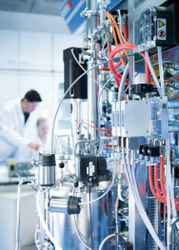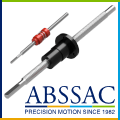
Posted to News on 27th Aug 2013, 13:32
Integrated modular systems are key to precise gas handling
The precise metering and controlling of gases has become one of the most crucial operations in processes across all industry types and applications: from medical equipment to laser and plasma cutters; to heat treatment and analytical technology; food processing and packaging to air handling and fuel cell technology - to name a few. The technology to achieve the required levels of control is complex, involving control of the widest range of gases, including toxic and aggressive types, often in harsh, hazardous environments; sometimes, in medicals for example, the technology makes all the difference between life and death.

In gas control applications numerous components interact with one another. These include solenoid valves, mass flow controllers (MFC), mass flow meters (MFM), sensors, switches, block-integrated check valves, integrated and replaceable filter elements and manual valves. When these discrete components are combined in systems they demand large amounts of installation space and pose problems for connectivity: the higher the number of connections, the higher the chance of leakage from the system.
Moreover, this approach presupposes that standard components will provide the required outcome. This is not generally the case. More often than not, specific customer needs require bespoke approaches, and these are best achieved by integrating gas-handling equipment in compact, often fieldbus-compatible, modular installations from a single-source supplier. As well as simplifying project engineering and overcoming the connectivity problem, this approach offers the key benefits of system accountability and future proofing of the installation, because upgrades are easy to effect.
Working in conjunction with a host of international clients, Brkert has developed some of the most advanced gas handling/blending equipment in the world. The company controls protective or reactive mixtures by combining various in-house technologies, including thermal mass or differential pressure flow and precision solenoid control valves to form perfect loops.
High levels of repeatability
Each of these loops or subsystems offers documented ratio control with millisecond reaction times and, importantly, fewer sealing points. The result of these systems is that customers have made their lasers burn brighter still; food processors have improved the look of their products; and ground-breaking developments have been made possible in fine chemical and biotech industries. In addition, operators of the systems across all industry sectors have benefited from high levels of repeatability and flexibility without the cost of expensive, less stable, pre-mixed gases.
At the heart of many Brkert systems are three key components, specially developed for gas handling. These are proportional solenoid valves, Mass Flow Meters and Controllers, both with optional fieldbus interfaces.
The facility of a proportional valve is to achieve especially precise control of temperature, pressure and the flow rate of gas mixtures and pure gases, which makes it suited for high-end medical applications in artificial respiration and anaesthesia. One such application is a specially designed gas mixer for a new, non-invasive, CPAP (Continuous Positive Airway Pressure) instrument for the intensive medical examination of breathing in premature babies. As well as providing traditional CPAP therapy, the instrument can also respond automatically and without additional accessories to apnoea phases, or can be used for non-invasive oscillation therapy. The core of the unit is the electronic gas mixer, which uses third-generation proportional valves. The mixer controls the oxygen concentration for the premature baby and dispenses the required flow rate with speed and precision. In addition, the gas mixer makes it possible to dispense the flow in other modes, such as oscillating or at two different levels.
Away from the medical sector, Brkert works with engineering consultants, integrators, contractors, original equipment manufacturers, and end users in a spectrum of industries from analytical devices to metal treatment.
Brkert offers optimised systems for laser cutting, powder coating, inert gas welding, glass forming, and gas blending. The MFM and MFC devices are used extensively in these applications. They are suitable for application areas where high precision and reproducibility are required - such as in burner technology, coating systems and fuel cell applications.
Low sensitivity to contamination
The MFC forms an integrated, fieldbus-compatible system, comprising a flow sensor, control electronics and control valve. Using this controller, mass flows of gases in the range from 0.005lN/min to 1500lN/min can be kept constant whilst maintaining a turn-down ratio of 1:50, or can follow a predefined set-point profile, regardless of external influences, such as pressure or temperature variations. The measurement is made in the main channel and provides the mass flow directly without any corrections: this method optimises the MFC operation via excellent dynamics and low sensitivity to contamination. An additional key benefit of the 8626 (and the Type 8700/8710 MFM) is that it can optionally be calibrated for two different gases, and the user is able to switch between these two gases.
Type 8626's sister unit, the Type 8700/8710MFM, also uses the mass flow principle. The design provides key benefits: by measuring mass gas flow - which is independent of pressure and temperature - rather than volumetric gas flow, the operation of the MFM is generally unaffected by fluctuations in line pressures and temperatures. This is important for users, because when piping expensive gases it is certainly more cost effective to keep track of the amount of gas used, based on mass, rather than volumetric flow.
The digital Type 8700 also benefits from Brkert's FlowCapillary sensor technology. Developed by Brkert specifically for use in its mass flow controllers, this technology isolates the sensor from the gas flow path, enabling the MFM to be used with aggressive gases where required.
In addition to the recent product which involved Brkert in producing an innovative gas mixer for a new CPAP system, other contemporary flagship Brkert projects for gas handling include an Atom Absorption Spectrometer and an integrated Argonblock for use in Inductive Coupled Plasma Spectroscopy.
The AA Spectrometer performs a spectro-analysis procedure for quantitative determination of chemical elements, employing the absorption of optical radiation (light) by free atoms in the gaseous state. Brkert worked with the developer of the spectrometer for a number of years, developing optimised, fieldbus-compatible (CanBus) gas handling (mixer) systems for use with nitrogen, natural gas, acetylene and also butane and propane.
Precise operation
Inductive Coupled Plasma (ICP) Spectroscopy is the accepted and most powerful technique for the analysis and quantification of trace elements in both solid and liquid samples. Its applications range from routine environmental analyses and geological applications, through to clinical research, material sciences and the semiconductor industry. Here again, Brkert worked with the developer of the new range of ICP spectrometers from initial design to manufacture of prototypes and final production runs of the Argon monobloc unit. The bespoke Argon block has three channels which are controlled in loops to perform functions such as cooling of the plasma torch, and delivering additional flow to prevent dirt entering the ICP process. In addition, there is also a nebuliser channel, the flow from which has to be very precise, stable and repeatable in order to enable analysis of the ICP probe in parts per million (PPM) or even, in extreme cases, parts per trillion. This precise operation is made possible by Brkert's custom-designed monobloc, complete with CanBus fieldbus connection to provide the customer interface.
Brkert has also released an All-in-one Gas Mixing Box which is a multi-gas mixer or dispenser for 2-4 gases. It can be ordered as a mixer with a maximum of four inlets and one outlet, or as a dispenser with one inlet and a maximum of four outlets. It uses Brkert Mass Flow Controllers with CMOS technology. These MFCs are known for fast response times, low pressure drop as well as superb stability, and the MFCs are also working with a wide range of non-corrosive gases. A touch-panel display is used to enter set points and to display outputs, while internal communication is entirely digital and based on RS485.
Brkert offer free training at its fully comprehensive training suite in Gloucestershire. A new course has been devised for gas applications, where experts from Brkert will share their experience in complete gas control loops. They will also consider the most effective gas control architecture to help you see and assess what is happening in your plant. For further details email [email protected], and to learn more about the metering and controlling of gases go to www.burkert.co.uk.
Fluid Control Centre
1 Bridge End
GL7 1QY
UNITED KINGDOM
+44 (0)1285 648720

































